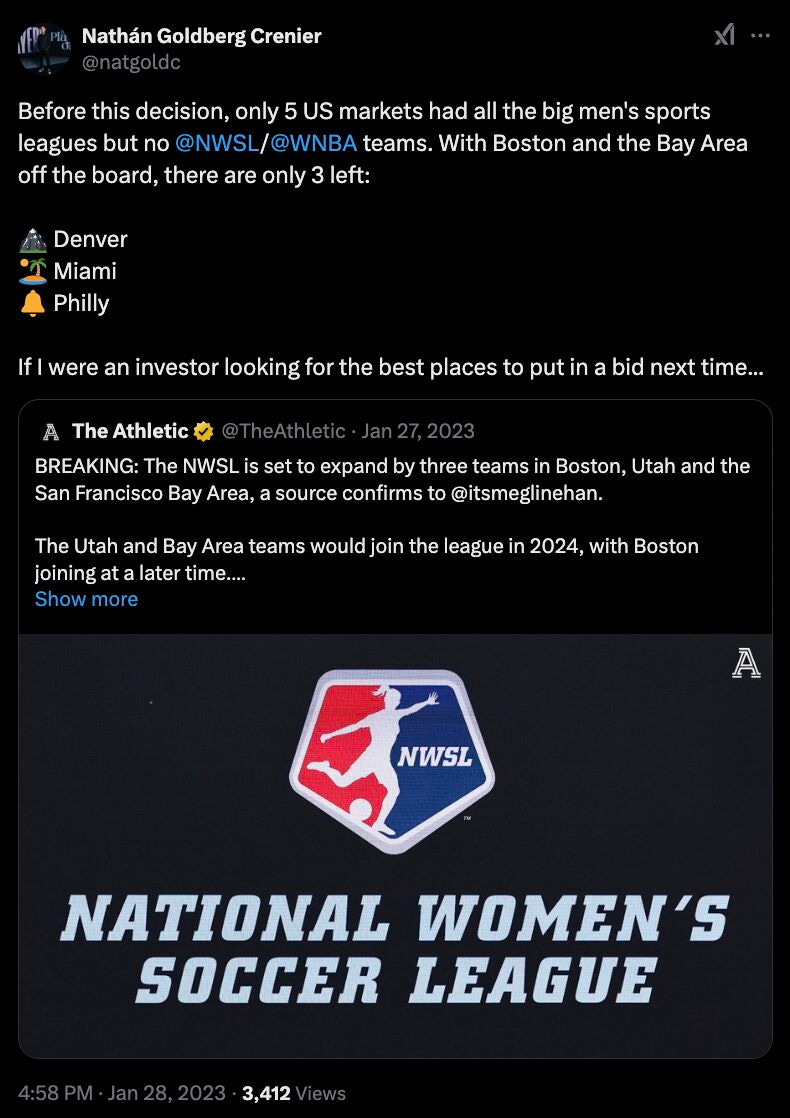The Goldilocks Zone for New Women’s Teams
Almost exactly two years before Denver was awarded the 16th NWSL franchise, I flagged Denver as a top market for future expansion for a very simple reason: it was one of only three American cities that (1) house a team in all five major men’s sports leagues (NFL, NBA, MLB, MLS, NHL) but (2) had no major professional women’s sports presence. This is an imperfect but useful way to identify sports towns that are “just right,” where the general population might be predisposed to support a team but where an NWSL club could capture a differentiated, underserved audience segment. Sure enough, two years and $110M later, Denver was the next city to join the league!
It really didn’t take a crystal ball to see how things would end up here. The last three expansion decisions the NWSL has made (San Francisco Bay, Boston, and Denver) all met those two criteria at the time they were awarded their franchises.1 After the fact, those markets turned out to be hot commodities for women’s sports in general: the Bay Area also gained a new WNBA team (the Valkyries) and Boston welcomed a new PWHL team (the Fleet). The Valkyries even broke the WNBA record for most season tickets before they even played a game. As for Denver, I’m so confident about its potential as a market for women’s soccer that I actually tried to marshal investors to bring a team to Colorado three years ago.
Where to Next?
If I were an investor looking to put in a bid for the next round of expansion, I would take really serious looks at Philadelphia and Miami, the only two cities left on that original list.2
Of course, the market itself isn’t the only thing to consider when evaluating the strength of an expansion bid: aside from committed owners with deep pockets, which at this point is barely the baseline, facilities play a huge role. At the moment, the Kansas City Current are leading the arms race in this regard with not only a bespoke training facility and the first-ever stadium built solely for an NWSL team, but also plans for a $1 billion mixed-use district on the land surrounding the stadium, earning the club the #1 spot on ESPN’s rankings for most ambitious NWSL franchise.
Aside from Denver, the other two finalists in the latest NWSL expansion round— Cleveland and Cincinnati—had publicly staked a lot of their bids on their facility plans: Cincinnati would have been co-owned by FC Cincinnati of MLS, meaning they would have access to a top-tier, soccer-specific stadium, while Cleveland were very vocal about their desire to build a new stadium primarily for women’s soccer and even acquired the land for it before the NWSL rendered its decision. Despite missing out on an NWSL franchise, Cleveland vowed to build a stadium anyway and joined the upcoming, not-yet-sanctioned WPSL Pro league instead.
Denver NWSL announced their facility plans only after they were awarded the franchise, but now we know why the league found their pitch so compelling. Having secured city council approval last week, the club is now cleared to build their own 14,500-seater stadium in an accessible downtown location, making it larger than Kansas City’s by about 3,000 seats. While the stadium is being constructed, the team will play in a modular field at the site of their permanent training center—a collaboration with the local Cherry Creek School District that is part of a new trend of high-impact public-private partnerships in women’s soccer.
Another market that was very outspoken about pursuing NWSL expansion was the Twin Cities, where Minnesota Aurora, a pre-professional USL W League team, has been eyeing a bid to join any one of several professional leagues. Aurora’s big (and I mean big) competitive advantage is that they have a proof of concept like nobody else: their summer-league matches already attract 5,000+ fans regularly, and their average attendance and merch sales have even rivaled some NWSL teams.3 As a community-owned club, Aurora’s biggest hurdle for making the jump to the pros seems to be the price tag. So, if you know someone with a lot of money who wants to make even more by investing in women’s soccer, send them to Minnesota!
The good news for everyone is that we’re in the midst of a true Big Bang of pro women’s soccer. With multiple leagues looking to expand, including the NWSL and the USL Super League, I hope it’s only a matter of time until every major (and even midsize) city in the country can cheer for a pro women’s team in their backyard.
Utah was a special case where a previously-negotiated franchise revival clause was simply activated by the new owners of the Utah Royals, so the league didn’t choose Salt Lake City from among other competing markets.
Depending on how broadly you define “Miami,” there is already a USL Super League team in the metro area in Fort Lauderdale.
Mind you, NWSL teams have more than just the summer to sell merch.





I am a USL Super League fan at heart. But I welcome any new professional women's team. I am excited about the WPSL's league, since I live in a smaller city, Peoria, IL